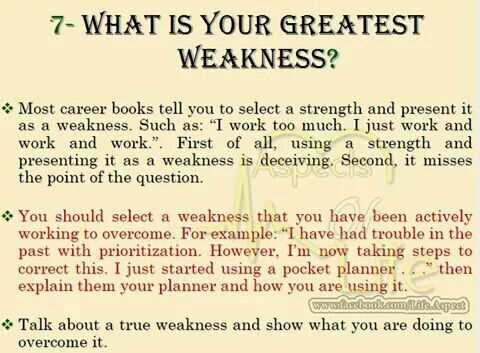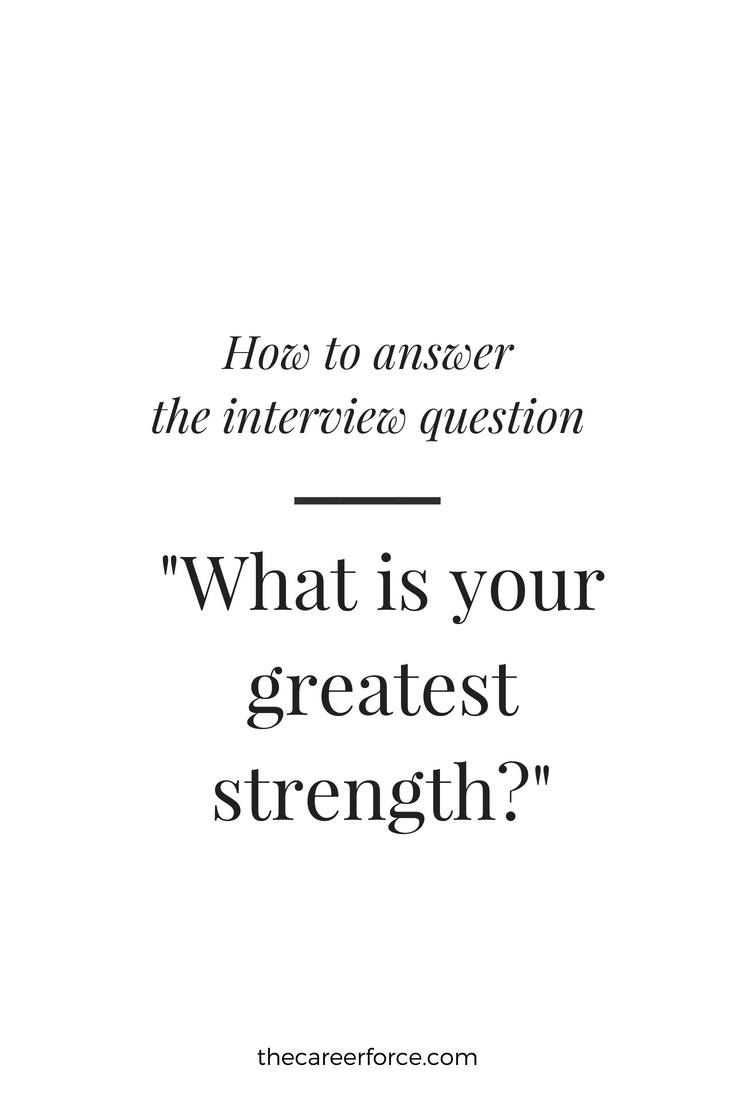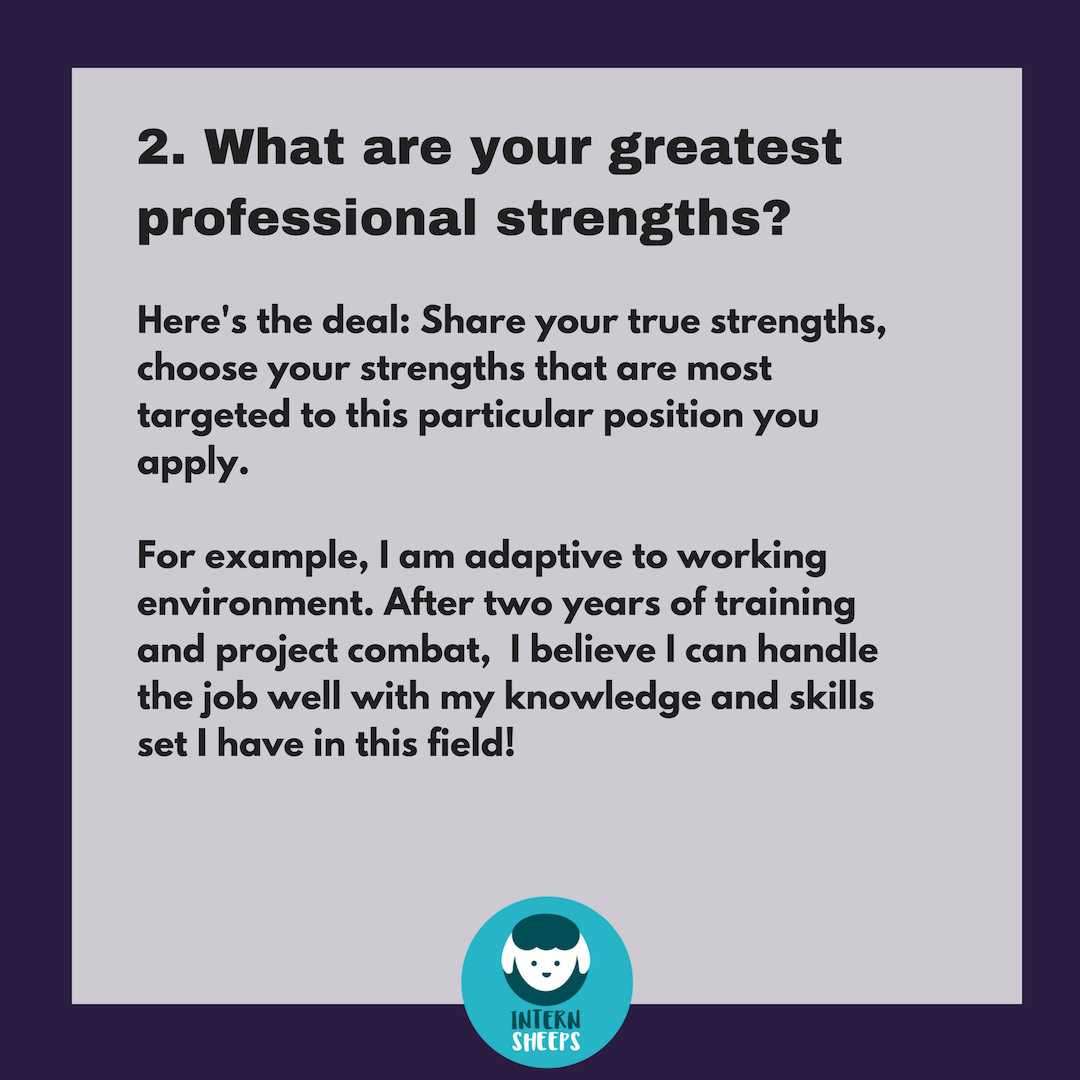How to Answer What is Your Greatest Strength in an Interview

One of the most common topics raised during job discussions involves showcasing personal qualities that make candidates stand out. Being able to present specific abilities or traits effectively can greatly influence how potential employers perceive a person’s fit for a role. Crafting a response that highlights relevant characteristics can make all the difference in securing a job.
Although it might seem straightforward, responding to this query requires a balanced approach. It’s essential to not only demonstrate self-awareness but also to align personal strengths with the needs of the position. A well-thought-out reply goes beyond simply listing skills and instead emphasizes how those qualities contribute to both individual and team success in a professional environment.
Crafting the Perfect Job Response
When faced with the task of describing personal qualities during a job conversation, it’s crucial to carefully shape your response. A strong reply should not only reflect true abilities but also align them with the role’s specific requirements. The key is to provide a well-rounded portrayal of yourself, showing both your expertise and your capacity to adapt to the challenges of the position.
To achieve this, focus on a few key attributes that are most relevant to the job you’re applying for. Rather than simply listing skills, demonstrate how these traits have helped you achieve past successes. Think about concrete examples from previous experiences that highlight your problem-solving capabilities, teamwork, and leadership. This approach not only makes your response more credible but also leaves a lasting impression on the interviewer.
Moreover, your reply should be concise and to the point. Avoid overwhelming the listener with unnecessary details. Keep your response focused, yet rich in examples that showcase your contributions in real-world scenarios. By doing so, you will not only address the question effectively but also show that you understand how your qualities can benefit the organization in the long run.
Understanding the Importance of This Question

This question is commonly asked during job discussions because it provides valuable insights into a candidate’s self-awareness and suitability for a role. Employers use this opportunity to gauge not only the qualities a person brings to the table but also their ability to reflect on past experiences and identify key traits that contribute to their success. How you approach this question can reveal much about your confidence, communication skills, and ability to prioritize what’s most relevant for the position.
Why Employers Ask This Question
- To assess self-awareness: Candidates must show they understand their own abilities and limitations.
- To determine fit: The response can highlight whether personal traits align with the company culture or job expectations.
- To gauge communication skills: A clear and concise response demonstrates the ability to communicate effectively under pressure.
The Impact of a Strong Response
- Building trust: A well-articulated reply fosters confidence in your abilities.
- Setting you apart: Offering specific examples helps differentiate you from other applicants.
- Highlighting problem-solving skills: Explaining how your qualities have helped you overcome challenges shows practical competence.
Common Mistakes to Avoid in Responses
During job conversations, certain errors can undermine even the best intentions. These mistakes often stem from misjudging what the employer values or failing to effectively showcase personal qualities. Recognizing and avoiding these pitfalls is crucial to presenting yourself in the best possible light and ensuring that your response highlights what truly matters to the interviewer.
- Being too vague: Offering a generic response without supporting examples can make your answer seem unconvincing and disengaged.
- Overconfidence: Claiming to be perfect or overly emphasizing one ability can make you come across as arrogant rather than self-assured.
- Listing irrelevant traits: Discussing abilities that do not relate to the job at hand can confuse the interviewer and detract from the strength of your response.
- Using clichés: Relying on overused phrases like “I’m a perfectionist” or “I’m a team player” can make your reply feel insincere and unoriginal.
- Exaggerating achievements: Overstating accomplishments or personal traits can backfire, especially if the interviewer probes for more details.
Choosing the Right Trait to Highlight
Selecting the most relevant characteristic to showcase is crucial for making a strong impression. The trait you choose should not only reflect your abilities but also align with the specific requirements of the role you’re applying for. Focusing on qualities that demonstrate your value to the organization will help you stand out and show that you understand what is needed to succeed in the position.
- Consider the role: Look at the job description and identify the skills or attributes that are emphasized. Choose qualities that match those needs.
- Be authentic: Pick a trait that truly represents you, rather than what you think the employer wants to hear. Authenticity builds trust and credibility.
- Show versatility: While highlighting one key quality, make sure it’s broad enough to demonstrate how you can contribute to different aspects of the job.
- Focus on results: Choose traits that have led to specific, measurable outcomes in the past. Providing examples of how these qualities have benefited previous teams or projects will make your response more impactful.
How to Relate Qualities to Job Requirements
To make a strong case for your candidacy, it’s essential to show how your personal qualities align with the specific needs of the job. This connection helps the employer see that you not only possess the right skills but also understand how those skills will be applied to the position. Relating your traits to the job requirements demonstrates that you’ve done your research and are prepared to contribute meaningfully from day one.
| Job Requirement | Relevant Personal Trait | How it Applies |
|---|---|---|
| Leadership and team management | Strong communication and organization | My ability to clearly communicate tasks and prioritize responsibilities has helped previous teams meet deadlines and exceed goals. |
| Problem-solving skills | Creative thinking and analytical ability | In my last role, I applied creative solutions to complex challenges, improving processes and increasing team efficiency. |
| Attention to detail | Thoroughness and precision | My careful approach to tasks ensures high-quality work, minimizing errors and meeting the company’s standards for excellence. |
Tailoring Your Response for Different Roles
When responding to questions about personal abilities, it’s essential to adjust your reply based on the specifics of the role you are applying for. The qualities you emphasize should be relevant to the responsibilities and expectations of the position. By aligning your response with the job’s requirements, you show the employer that you are the ideal candidate for the position.
How to Tailor Your Reply
- Analyze the job description: Identify key traits the employer is seeking, and choose personal qualities that align with those needs.
- Consider the company culture: Reflect on the company’s values and highlight qualities that resonate with its mission and work environment.
- Match your skills to the role’s challenges: Think about the specific challenges the position involves and demonstrate how your traits will help you address them effectively.
Examples of Tailored Responses
- For a leadership role: Emphasize qualities like decision-making, team motivation, and conflict resolution.
- For a technical position: Highlight problem-solving abilities, attention to detail, and technical expertise.
- For a customer service position: Focus on communication skills, empathy, and patience in handling customer needs.
Balancing Confidence and Humility in Responses
When discussing personal qualities in a professional setting, it’s important to strike a balance between showcasing self-assurance and demonstrating modesty. Overemphasizing one over the other can create an imbalance that affects how you are perceived. The key is to present your abilities confidently, while acknowledging that you are continually learning and growing.
Why Both Confidence and Humility Matter

- Confidence: A strong sense of self-belief shows that you trust in your abilities to perform well and contribute meaningfully to the organization.
- Humility: A humble approach reflects the understanding that no one is perfect and that growth comes from learning and collaborating with others.
How to Maintain the Right Balance
- Acknowledge team contributions: While highlighting personal accomplishments, be sure to recognize the role others played in your successes.
- Be honest about challenges: Mention areas where you’ve faced obstacles, but focus on how you’ve worked to overcome them and grow.
- Provide measurable results: Share examples of your impact, but avoid exaggeration. Let facts and evidence back up your claims.
Using Examples to Support Your Strength
When discussing personal abilities, providing concrete examples can significantly strengthen your response. Rather than simply stating a quality, sharing specific instances where you’ve successfully applied it in the past allows the interviewer to see the real-world impact of your traits. Examples serve as proof that your qualities are not just theoretical but have led to tangible, positive outcomes.
- Be specific: Rather than speaking in generalities, describe a particular situation where you demonstrated the trait. Highlight the context, actions you took, and the result.
- Use measurable outcomes: Whenever possible, include figures or data that demonstrate the effectiveness of your abilities. For example, “I increased sales by 20% through improved client relations.”
- Show relevance: Ensure the example is related to the role you are applying for. If you’re applying for a leadership position, focus on examples that showcase your leadership skills.
What Employers Really Want to Hear
Employers are looking for candidates who can effectively demonstrate their value to the company. When discussing personal qualities, they want to hear about traits that align with the job requirements and the company’s needs. It’s not just about listing strengths, but about conveying how those abilities can contribute to the success of the team and the organization.
Key Traits Employers Value
- Problem-solving abilities: Employers appreciate candidates who can think critically and find creative solutions to challenges in the workplace.
- Adaptability: The ability to adjust to changing circumstances and remain productive in different situations is highly valued in dynamic work environments.
- Team collaboration: Employers seek individuals who work well with others, communicate effectively, and contribute to a positive, cohesive work culture.
- Initiative: Taking proactive steps to improve processes or address issues shows that you’re not just waiting for instructions but are motivated to make a difference.
How to Frame Your Traits
- Connect your skills to business goals: Employers want to see how your abilities will directly impact the company’s objectives, such as increasing efficiency or driving growth.
- Show willingness to learn: Highlighting your openness to feedback and continuous improvement reassures employers that you’re committed to growing within the role.
- Provide examples of past success: Whenever possible, link your traits to past experiences where they led to measurable results or successes.
Demonstrating Self-Awareness in Your Response
Being aware of one’s own abilities and limitations is a key component of emotional intelligence and professionalism. When discussing personal qualities, showcasing self-awareness helps employers understand that you have a realistic view of your skills and growth areas. It reflects maturity and a willingness to improve, which are highly valued in any professional setting.
Why Self-Awareness Matters
- Builds trust: Acknowledging both strengths and areas for development fosters credibility. It shows that you are genuine and open to feedback.
- Demonstrates growth potential: Employers appreciate candidates who are self-reflective, as it indicates that they are likely to seek continuous improvement in their role.
- Promotes effective teamwork: Being aware of how you work with others helps you understand your role within a team and how to collaborate more effectively.
How to Show Self-Awareness
- Acknowledge areas for growth: It’s important to mention that while you possess certain strengths, you also recognize areas where you aim to improve. This shows balance and humility.
- Discuss how you’ve learned: Share examples of times when you identified areas for improvement and took steps to address them.
- Emphasize adaptability: Demonstrating that you are open to change and willing to learn from experiences will show that you are continuously developing professionally.
Why Honesty is Crucial in Responses
Honesty plays a vital role in any professional conversation, particularly when discussing personal qualities. Being truthful not only helps build trust but also sets realistic expectations for both you and the employer. Overstating your abilities or fabricating achievements can backfire, especially if the truth comes to light later. It’s essential to communicate authentically, showing that you are self-aware and confident in your true capabilities.
Benefits of Honesty
| Benefit | Why It Matters |
|---|---|
| Builds Trust | Being truthful fosters a sense of trust between you and the employer, setting a foundation for a positive working relationship. |
| Realistic Expectations | Honesty ensures that both parties understand what to expect, reducing the risk of mismatched expectations that could lead to dissatisfaction. |
| Reflects Professional Integrity | Employers value candidates who demonstrate integrity, as it suggests you’ll bring the same level of honesty to your work and interactions with colleagues. |
| Promotes Personal Growth | By acknowledging areas of improvement, you show that you are self-reflective and open to learning, which is crucial for development in any role. |
How to Maintain Honesty
- Be transparent: If you lack certain skills or experience, be open about it. Frame it as an opportunity for growth, showing your willingness to learn.
- Stick to facts: Share specific examples of your abilities or accomplishments, ensuring they are accurate and verifiable.
- Acknowledge weaknesses: Recognizing areas for improvement shows that you are humble and committed to self-improvement.
Linking Your Strengths to Company Values
Aligning personal qualities with the values and mission of a company is a powerful strategy in professional conversations. It shows that you not only understand what the organization stands for but also that your skills and principles are a natural fit. This connection can help employers see how you’ll contribute to their culture and goals, making you a more attractive candidate for the role.
When discussing personal abilities, it’s important to demonstrate how these qualities will benefit the company’s long-term success. Whether it’s problem-solving, leadership, or communication, showing how your traits resonate with the organization’s core values builds a strong case for your candidacy.
- Research company values: Before discussing personal qualities, take the time to understand the company’s culture and core beliefs. This will help you tailor your response.
- Highlight relevant traits: Focus on qualities that align with the company’s mission. For instance, if teamwork is a core value, emphasize your collaborative abilities.
- Use specific examples: Provide concrete examples that show how you’ve demonstrated these qualities in previous roles, linking them back to the organization’s needs.
How to Handle Follow-Up Questions

After discussing your key abilities, follow-up questions often arise to explore your responses further. These inquiries are meant to provide deeper insight into your qualifications, experiences, and how well you match the role. Handling these questions effectively requires a calm demeanor, clear communication, and the ability to elaborate on your initial response with specific examples and details.
Tips for Responding to Follow-Up Questions
- Stay composed: Take a moment to gather your thoughts before responding. It’s important to remain calm and confident while providing your answer.
- Be specific: Follow-up questions often ask for more details. Use concrete examples from your past experiences to illustrate your points clearly.
- Clarify if needed: If a follow-up question is unclear, don’t hesitate to ask for clarification. It’s better to ensure you understand before answering.
- Relate to the job: Ensure your follow-up responses align with the position’s requirements. Demonstrate how your traits can address the company’s specific needs.
Examples of Follow-Up Questions
- Can you give an example of a time when you demonstrated this trait?
- How do you plan to improve or develop this ability in the future?
- Can you explain a situation where this quality helped you overcome a challenge?
Keeping Your Answer Concise and Focused
When discussing personal attributes, it’s crucial to maintain clarity and precision. While it’s tempting to elaborate on every aspect of a particular trait, providing a clear and focused response is more effective. Employers appreciate candidates who can express themselves succinctly without over-explaining or going off-topic. Keeping the conversation direct helps highlight your key skills while respecting the interviewer’s time.
- Stick to one main point: Choose one key ability to emphasize and explain how it’s relevant to the role.
- Use specific examples: Briefly describe one concrete example that demonstrates the quality you are highlighting. Avoid lengthy stories.
- Avoid tangents: Stay on track and avoid bringing up unrelated experiences or abilities unless asked.
- Be mindful of time: Practice answering in a way that stays within a 1-2 minute timeframe, keeping your response clear and efficient.
Practice Strategies for Delivering Your Answer
Preparation plays a vital role in effectively communicating your qualities. To provide a confident and compelling response, it’s essential to practice how you present your abilities. Rehearsing helps ensure that you stay clear and concise while conveying the right message. Below are some strategies that can make a significant difference in how you articulate your strengths.
Rehearse Out Loud
Speaking your response aloud helps you become more comfortable with the phrasing and delivery. Practice in front of a mirror or record yourself to analyze your tone, body language, and pacing. This will give you a better sense of how your message is coming across.
Simulate Real-Life Scenarios
Another effective practice strategy is to simulate the real conversation. Ask a friend or mentor to play the role of the interviewer. This will help you get used to the dynamics of the situation and allow you to refine your responses based on feedback.
- Prepare for follow-up questions: Anticipate questions that may arise from your response and practice addressing them briefly.
- Focus on clarity: Keep your delivery simple, ensuring you stay on point and don’t ramble.
- Refine your tone: Practice speaking in a calm, confident, and approachable manner to make a positive impression.
How to Stand Out with Unique Strengths
When it comes to showcasing your abilities, standing out requires more than just mentioning common traits. To truly make an impact, it’s essential to identify and communicate qualities that differentiate you from other candidates. This not only highlights your distinctiveness but also demonstrates the value you can bring to the organization.
Focusing on attributes that are less frequently discussed can help capture the attention of interviewers. By presenting these attributes in a way that aligns with the role you’re applying for, you show your awareness of both personal qualities and how they can benefit the company.
Identifying Distinctive Traits
Think about qualities that are unique to you and set you apart from others. These may include specialized skills, experiences, or personal characteristics that can be an asset in your potential role. Consider attributes like:
| Trait | Why It Stands Out |
|---|---|
| Creative Problem-Solving | Ability to think outside the box and offer fresh solutions in challenging situations. |
| Adaptability | Willingness to adjust to changing environments and handle uncertainty with ease. |
| Leadership Skills | Proven ability to motivate and guide teams towards common goals with empathy and clear direction. |
| Emotional Intelligence | Understanding of how to manage emotions effectively and work well with others in diverse settings. |
Choosing one or more of these qualities to highlight can give you an edge over other candidates. Make sure to provide examples of how you’ve successfully applied these traits in your previous work to add credibility to your claims. Ultimately, standing out is about demonstrating how these distinct characteristics make you a valuable addition to any team or organization.
Evaluating Your Strengths for Relevance
When discussing personal qualities, it’s essential to ensure they align with the needs of the role and organization. Not all positive traits will be equally valuable in every context, so evaluating which skills or abilities are most relevant to the position can make a significant difference. By tailoring your strengths to the specific requirements of the job, you demonstrate a deep understanding of the role and highlight how your attributes can contribute to its success.
Aligning Traits with Job Requirements
To ensure relevance, start by carefully reviewing the job description. Identify key responsibilities and qualities the employer seeks, then match your strengths to these. Focus on areas where you can directly contribute to the company’s goals, demonstrating both your self-awareness and understanding of what the role demands. For example:
- Communication Skills: If the role requires frequent collaboration or client interaction, showcasing your ability to clearly communicate ideas can be an asset.
- Time Management: In positions with tight deadlines, emphasizing your organizational skills and ability to manage multiple tasks is crucial.
- Problem-Solving: If the job involves tackling complex issues, discussing your analytical approach to finding solutions will show your value in overcoming challenges.
Demonstrating Practical Application
It’s not enough to simply mention traits; you should also illustrate how you’ve applied them in real-world situations. Provide examples where your qualities have led to measurable outcomes, such as improved efficiency, successful projects, or positive team feedback. This reinforces the connection between your abilities and the employer’s needs, showing you are ready to make a tangible impact from day one.
By evaluating your strengths for relevance and carefully selecting those that best match the job, you position yourself as a well-suited candidate who can bring immediate value to the team. Tailoring your strengths in this way demonstrates professionalism, thoughtfulness, and a proactive approach to aligning your skills with the company’s objectives.